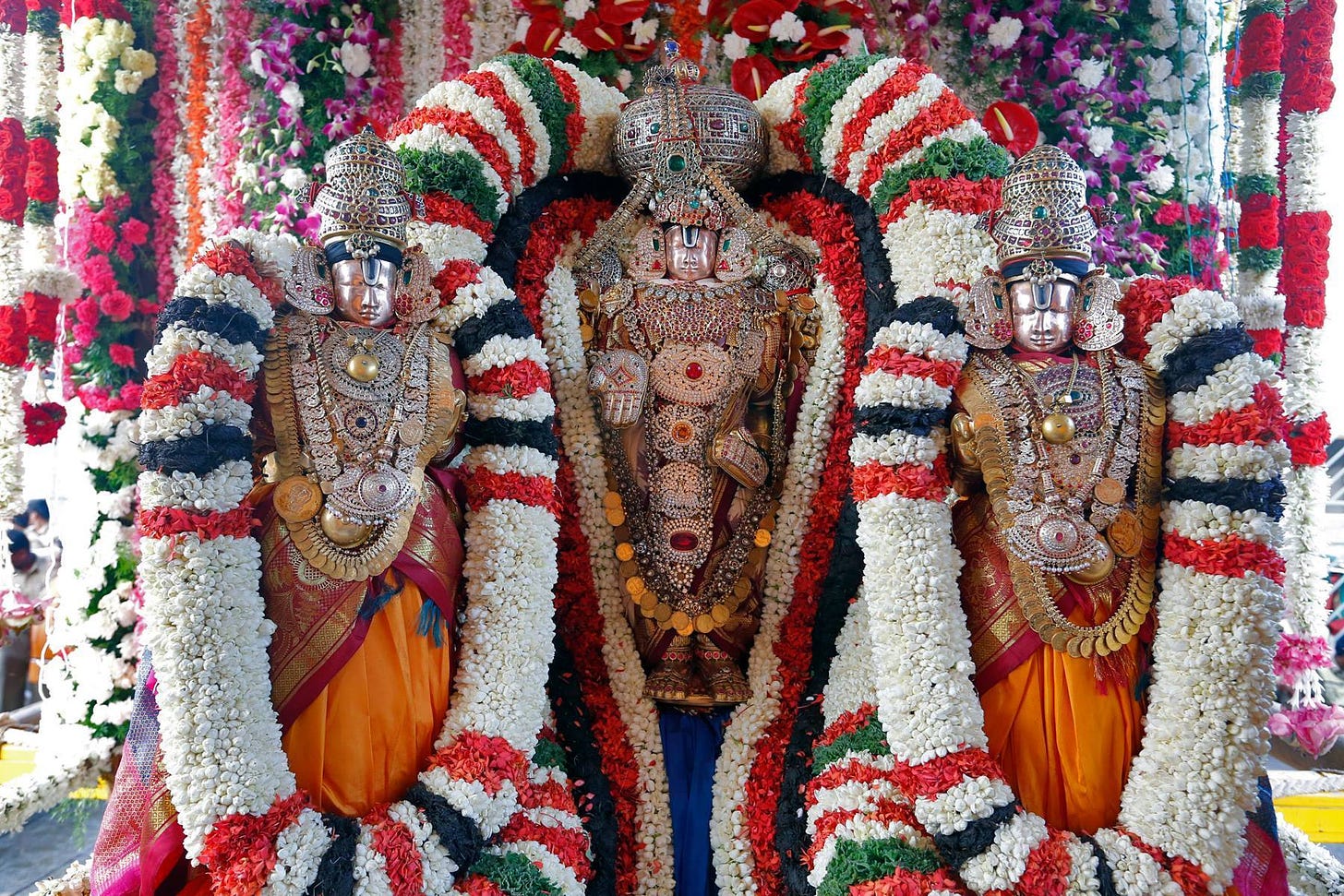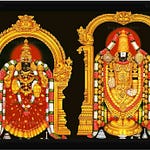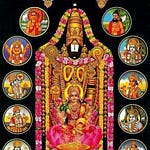We are into the final third of the Śrī Veṅkaṭeśa Suprabhātam now, with just nine verses to go. Of these, verses 21 through 24 are all identical in structure: they are simply lists of names of Lord Śrīnivāsa, invoking Him directly. We will look at two verses together at this point, and look at verses 23 and 24 next time.
Śrī-Bhūmi-nāyaka! Dayā-ādi-guṇâ-amṛtâ-abdhe! Devâ-adhideva! jagad-eka-śaraṇya-mūrte! | Śrīmann! Ananta(!)[-]Garuḍâ-ādibhir arcitâ-aṅghre! Śrī-Veṅkaṭâcala-pate! tava suprabhātam || (VSu 21) Śrī-Padmanābha! Puruṣôttama! Vāsudeva! Vaikuṇṭha! Mādhava! Janârdana! Cakra-pāṇe! | Śrīvatsa-cihna! śaraṇâgata-pārijāta! Śrī-Veṅkaṭâcala-pate! tava suprabhātam || (VSu 22) श्री-भूमि-नायक ! दया-ऽऽदि-गुणा-ऽमृता-ऽब्धे ! देवा-ऽधिदेव ! जगद्-एक-शरण्य-मूर्ते ! श्रीमन्न् ! अनन्त(!)(-)गरुडा-ऽऽदिभिर् अर्चिता-ऽङ्घ्रे ! श्रीवेङ्कटाचल-पते! तव सुप्रभातम् ॥ 21 ॥ श्री-पद्मनाभ ! पुरुषोत्तम ! वासुदेव ! वैकुण्ठ ! माधव ! जनार्दन ! चक्रपाणे ! श्रीवत्स-चिह्न ! शरणा-ऽऽगत-पारिजात ! श्रीवेङ्कटाचल-पते! तव सुप्रभातम् ॥ 22 ॥
[21] Beloved Lord of Śrīdevī and Bhūdevī, of the entire cosmos! O ocean of pure nectar which are Your infinite virtues foremost of which is Your Dayā! Supreme Overlord of all the gods! Sole shelter of refuge for the entire cosmos! Blessed, fortunate, limitless Lord! Your feet are worshipped by Ādiśeṣa, Garuḍa and the nitya-sūris: O Lord of the sacred mountain wealth-weaving, sin-cleaving Veṅkaṭam, a blessed morning unto You! [22] Lord with the sacred lotus in His navel! Supreme Being! O Kṛṣṇa, son of Vasudeva! O Lord with the impregnable abode Vaikuṇṭham! Mādhava, Spouse of the Divine Mother! Janārdana, crusher of foes! Cakrapāṇi, discus-wielder! Bearer of the sacred Śrīvatsa mark! Wish-granting tree for those who have surrendered to You! O Lord of the sacred mountain wealth-weaving, sin-cleaving Veṅkaṭam, a blessed morning unto You!
Juliet’s naïveté; or, the importance of names
As I have said and written on many an occasion, I deeply disagree with Juliet’s famous remark (Romeo and Juliet, Act II, Scene II):
What’s in a name? That which we call a rose By any other word would smell as sweet.
The second assertion here has some semblance of truth, though even here the suggestive power of naming is quite strong. But the first (rhetorical) question here is bluntly incorrect, as was recognized quite catchily even in Roman times by the Latin adage nomen est omen: “The name is a sign.” There is even a hypothesis known as nominative determinism, with at least some evidence supporting it, that people with certain names are more likely to adopt certain careers.
When we move from contemporary folk sociology to Hindu theology, though, we move into a realm where names, especially the names of the Divine, are deeply revelatory of some element of the Divine Nature. The linguistic analysis of divine names can get extraordinarily subtle and technical in Sanskrit, getting into deep linguistic and philosophical discussions. As a result, and especially given Upaniṣadic pronouncements on the limitations of language1, it is essential to study how Divine names can reveal to us something about the Divine.
High-level themes
While we will soon take a look at the names of Lord Śrīnivāsa in these verses, let us start by looking at some common themes across the three verses. We can loosely categorize these names into the following (non-exclusive and non-exhaustive) buckets:
Names expressing an intra-Divine relationship, between Lord Śrīnivāsa and Mahālakṣmī in Her various forms: Śrī-Bhūmi-nāyaka, Śrīman, and Mādhava (when understood as Mā-dhava)
Names expressing the lordship of the Lord over other deities: Devâdhi-deva and (Ananta-)Garuḍâ-’’dibhir arcitâṅghri
Names expressing something about the essential nature of the Divine: Śrīman, Ananta, Puruṣôttama, Vāsudeva
Names addressing one or more of the divine qualities of Lord Śrīnivāsa: Dayā-’’di-guṇâ-’mṛtâ-’bdhi, Mādhava (when understood as a derivative of madhu “honey”), Vaikuṇṭha
Names describing the physical forms or manifestations of the Lord: Śrī-Padma-nābha, Cakra-pāṇi, Śrīvatsa-cihna, and of course Śrī-Veṅkaṭâcala-pati
Names addressing the relationship of the Lord to His devotees: jagad-eka-śaraṇya-mūrti, Janârdana, śaraṇâgata-pārijāta
Names by verse
We will now look at each of the names, verse-by-verse. In cases where the name is taken from, or extremely similar to, a name in the Viṣṇu Sahasranāma, I will offer (in the footnote), a quick summary of the meaning of that name as per the versification of the commentary of Swāmī Parāśara Bhaṭṭar.
Verse 21
Right away, we notice that Verse 21’s names cut across all of the categories above. (In effect, these categories are human attempts to understand the unlimited and illimitable Divine nature by circumscribing it into a few narrow pigeonholes!)
By beginning with Śrī-Bhūmi-nāyaka, we see, yet again, the essential importance of Mahālakṣmī in the Śrīvaiṣṇava tradition: She comes First even when He is being talked about! Also notice here that the Divine Feminine is being expressed by two names: Śrī and Bhūmi, thus capturing Her dual celestial and terrestrial natures and hence implying His simultaneous lordship over both realms.

Lord Malayappa Swāmī with Śrī-devī and Bhū-devī (source) The second name, Dayā-’’di-guṇâ-’mṛtâ-’bdhi, should remind us of a previous name from verse 13, jagad-eka-dayaîka-sindhu. But whereas in verse 13 the name focused on Lord Śrīnivāsa’s compassion to the exclusion of all else, here the name focuses on Lord Śrīnivāsa’s Compassion as the foremost of all His infinite qualities.
Also note the connection between the Divine Feminine in the previous verse and the prominence given to Dayā, divine compassion personified in feminine form, in this verse. This is exemplified in Swāmī Vedānta Deśika’s Dayā-śataka on Lord Śrīnivāsa.
Also note that this ocean is no mere watery ocean, but one of immortality-bestowing ambrosia: the Lord’s compassion, further differentiated and manifested as His qualities, is the guide to our eternal beatitude.
The third name, devâdhideva, the supremacy and sovereignty of Lord Śrīnivāsa over all deities. This name is sometimes rendered as devâdideva, which conveys the same essential meaning without much of a difference.
The fourth name, jagad-eka-śaraṇya-mūrti, now expresses Lord Śrīnivāsa’s relationship to us: He is our refuge, and we need worry about no other. (It also thus reinforces the meaning of the previous name as well, by underscoring the fundamental nature of His ultimate superiority over all other deities.)
The fifth name, Śrīman, is one we have already seen before in verse 13. It expresses the relationship between the Divine Lord and the Divine Lady, but in a manner that highlights Their inseparability and intrinsic interweaving. It thus reveals the fundamental nature of the Divine, with its Masculine and Feminine aspects eternally married together.2
The next name can be split into two names, giving us three options:
Taken as a whole, Ananta-Garuḍâ-’’dibhir arcitâ-’ṅghri expresses the relationship between the Lord and His eternal host of divine beings, the nitya-sūris, who include both Ananta or Śeṣa (the Cosmic Serpent) and Garuḍa (the divine eagle). The association of the snake and the eagle (mortal enemies in our world) also reinforces a point from verse 17 about the power of the Divine to unite even polar opposites.
Split apart, the first part is Ananta, referring this time to one of the essential qualities of the Divine Person: His infinitude.
The second part be Garuḍâ-’’dibhir arcitâ-’ṅghri, which expresses the same idea as above, though without the subtext of Divine synthesis of polarities.
Verse 22
This verse in particular is full of references to names of the Lord from the Viṣṇu Sahasranāma.
The first, Śrī-Padma-nābha, refers to the role of the Lord (accompanied by His Śrī) in the creation and support of the universe.3 Although the name literally means “lotus-navel” and the Lord is frequently depicted thus literally, the etymologies of the word reveal the deeper meanings of this name.
The second, Puruṣôttama, can be interpreted in two different ways.4
In reference to the Divine’s incarnations in human form, it refers to His perfection of human behavior and the exemplariness of conduct displayed by His avatāras. Thus, for instance, Śrī-Rāma is often called maryādā-puruṣôttama, the “best of men due to his observance of boundaries”.
In reference to the Divine person directly, it refers, not to the Divine as belonging to a class of persons like humans, but rather as being exalted above all such classes and classifications. Hence this name emphasizes the absolute transcendence and superiority of the Lord.
The next name, Vāsudeva, is one of the most important in the Śrīvaiṣṇava and Pāñcarātra traditions; so much so, that after offering a fairly elaborate analysis of the name, Parāśara Bhaṭṭar wraps up by saying «guhyam» iti nâ ’tivyajyate (“since it is a sacred mystery, we do not over-elaborate”)!5
One way to understand the name is as a derivative of the name Vasudeva. In this case, Vāsudeva would refer to Kṛṣṇa the son of Vasudeva.
At the cosmic level, this name is interpreted as a compound of two elements, Vāsu and Deva. It thus refers to the Lord’s all-pervading and all-illuminating nature, as well as His sense of play in doing so.
The next name, Vaikuṇṭha, is most often thought of as a name for the Supreme Heaven in which the Supreme Lord eternally dwells with the Divine Goddess. However, it is also a name for the Lord Himself, referring both to His own unassailability as well as His ability to destroy all obstacles (not just for Himself, but also for His devotees).6
The next name, Mādhava, is one I have already written about in the context of the Bhagavad Gītā, with a reflection on why this is the first name by which the Blessed Lord Kṛṣṇa is referred to in the Gītā.7
He is also known as Janārdana, which literally means “tormentor of people”. This seems very shocking at first, but it in fact applies specifically to the Lord’s role in protecting His devotees from evildoers.8
Lord Śrīnivāsa is also known as Cakra-pāṇi, the wielder of the discus. Now the discus is not just a weapon but an eternal aspect of the Divine, known as Sudarśana. Not only does Sudarśana help Him live up to His name Janārdana, but he is also known as Heti-rāja, Lord of (the Supreme Lord’s) weapons. Indeed, Swāmī Vedānta Deśikar has a whole work called the Ṣoḍaśāyudha-Stotra that describes how each of his weapons is in fact representative of a specific aspect of the Divine.9
He is also known as Śrīvatsa-cihna because He bears a unique characteristic (lakṣaṇa) on His chest known as the Śrīvatsa, which is an indication of the eternal presence of the Supreme Goddess Mahālakṣmī on His chest. While this specific name is not in the Viṣṇu Sahasranāma, a very similar one is.10
Incidentally, Śrīvatsa-cihna is also the birth name of Swāmī Kūrattāḻvān, about whom we have spoken earlier and of whom Swāmī PB Aṇṇan Swāmī was undoubtedly fully aware.He is also known as śaraṇāgata-pārijāta, literally the wish-granting tree (pārijāta) for those who have come (āgata) to take refuge (śaraṇa) at His feet. This makes Lord Śrīnivāsa infinitely superior to the wish-granting tree (kalpa-taru) in heaven, for it grants merely material wishes to just the gods, whereas He is accessible to all on earth and grants both material and spiritual blessings to His devotees—even if they don’t ask for them!
|| Śrī-Padmāvatī-nāyikā-sameta-Śrī-Śrīnivāsa-parabrahmaṇe namaḥ ||
Most famous among these would be the statement in the Brahmânandavallī of the Taittirīyôpaniṣad:
yato vāco nivartante | aprāpya manasā saha | ānandaṃ Brahmaṇo vidvān | na bibheti kutaścanêti ||
One who knows the bliss of the Absolute from which words turn back unreached by the mind has no fear of anything whatsoever.
Śrīman appears three times in the VS:
[n#22] viruddhâ-’’kāravattve ’pi Śrīmān sarva-manoharaḥ |
He is Śrīmān because He is all-enchanting even when taking on forms that are mutually opposed.
[n#180] divya-bhūṣaṇa-sampadbhir. yuktaḥ Śrīmān sadā smṛtaḥ |
He is remembered as Śrīmān for He is eternally endowed with divine ornaments and divine wealth.
[n#222] matsya-rūpâvatāre ’pi Śrīmān kamala-netrataḥ
He is Śrīmān (endowed with fortune) due to His lotus-eyes even during His piscine incarnation.
Padmanābha shows up three times in the Viṣṇu Sahasranāma, interpreted as follows by Parāśara Bhaṭṭar:
[n#48] kālâ-’’tmakaṃ tu yat padmaṃ nābhau yasya sa ucyate | Padmanābhaś câ ’ṣṭa-varṇo mahā-santāna-do Manuḥ ||
He the eightfold Supreme Person who gives rise to the Great Chain of Being is called Padmanābha in whose navel is a lotus which is in fact Time itself.
[n#198] pārthivaṃ bhūri-padmaṃ tu nābhāv aṣṭa-dalaṃ mahat | yasya hemamayī divyā karṇikā Merur ucyate | yasya nābhau tad-utpattiḥ Padmanābhaḥ sa ucyate |
He is called Padmanābha in whose navel is born a colossal eight-petalled lotus, of earthly substance whose divine golden pericarp is Mount Meru.
[n#348] nābhiś ca padmavad yasya Padmanābhaḥ sa ucyate |
He is called Padmanābha whose navel is like a lotus.
Puruṣôttama is one of the earliest names in the Sahasranāma, #28 in fact. In support of the second meaning I have supplied above, Parāśara Bhaṭṭar says:
[n#28] baddhâ-’’di-puruṣebhyo yo hy utkṛṣṭaḥ Puruṣôttamaḥ |
He is Puruṣôttama who is absolutely superior to all persons— be they bound souls (trapped in saṃsāra), or liberated, or eternally free.
The name Vāsudeva occurs twice, as VS n#334 and as VS n#701. Under the first of these, Parāśara Bhaṭṭar offers three different cosmic-level analyses of this name:
[n#334] sarva-bhūtān vāsayati Vāsuḥ sa parikīrtitaḥ | diva-dhātor api krīḍā-’’dy-arthakatvād viśeṣataḥ «Vāsuś ca Devaś cê» ’ty eṣa Vāsudevaḥ prakīrtitaḥ || sarva-bhūteṣv api vasan, svasmin bhūtāni vāsayan yaḥ krīḍati mudā yad vā Vāsudevaḥ sa ucyate || sarvatrâ ’sau, samastaṃ ca vasaty atrê ’ti vai yataḥ tataḥ sa «Vāsudevê» ’ti vidvadbhiḥ paripaṭhyate ||
He causes all beings to live, and hence is known as Vāsu. Since the root diva can also specifically mean “to play”, etc., He is well-known as Vāsudeva because He is Vāsu the giver of life & He is Deva the playful lord as well. Alternatively: He is known as Vāsudeva for He delights in His cosmic play: Himself dwelling in all beings, and causing all beings to dwell in Himself. The wise understand Him to be Vāsudeva since He is in everything, and everything dwells in Him.
Then, under name #701, Parāśara Bhaṭṭar adds the interpretation linked to Lord Kṛṣṇa:
[n#701] Vasudevâ-’patya-bhāvād Vāsudevaḥ prakīrtitaḥ |
He is well-known as Vāsudeva on account of His being the son of Vasudeva.
Parāśara Bhaṭṭar imparts a creative spin to the name Vaikuṇṭha (VS n#406)., focusing on the Lord’s ability to eliminate obstacles specifically to the union of His devotees with the Divine:
[n#406] saṃśleṣa-pratighātaś ca kuṭhi-dhātv-artha ucyate | vigataḥ sa ca yeṣāṃ te vikuṇṭhāḥ syur udīritāḥ | teṣām evaî ṣa iti hi Vaikuṇṭhaḥ parikīrtitaḥ ||
The root kuṭhi refers to an obstacle to union; Those for whom such obstacles have been eliminated are known as vikuṇṭhas; and so He is known as Vaikuṇṭha for He is ever with them alone.
The name Mādhava appears three times in the VS (as VS n#73, VS n#169, and VS n#741). The three interpretations are as follows:
[n#73] Śriyaḥ Śraddhā-ādi-nāmnyāś ca patir Mādhava iṣyate |
Parāśara Bhaṭṭar’s prose discussion of the name Mādhava at its first occurrence is quite substantial and cites extensively from various texts as well. This half-verse is an extremely pithy rendition of the whole.
He is known as Mādhava as He is the Husband of Śrī, who is also known by other names like Śraddhā, and so on.
Under n#169, Parāśara Bhaṭṭar offers two further interpretations of Mādhava:
[n#169] mā vidyā tu Hareḥ proktā, tasyāḥ svāmī dhavaḥ smṛtaḥ | tasmān Mādhava-nāmā asau Brahma-vidyā-prado Manuḥ | maunād dhyānac ca yogāc ca Mādhavaḥ parikīrtitaḥ ||
Since mā stands for esoteric knowledge of Lord Hari, and dhava is understood to be the master of this knowledge, therefore He the Supreme Person who presents the supreme knowledge of Absolute Being is known by the name Mādhava. He is also famous as Mādhava because of [being attainable through] silence, contemplation, and yoga,
For the third occurrence of Mādhava, Parāśara Bhaṭṭar daisy-chains the meanings of the previous two names when explaining the meaning of Mādhava itself:
[n#739] lokānāṃ sva-janatvād dhi Loka-bandhur iti smṛtaḥ | [n#740] loka-bandhutva-mūlaṃ hi loka-svāmitvam ity ataḥ svābhāvikāc ca sambandhāl Loka-nātha itî ’’ritaḥ || [n#741] loka-nāthatva-sambandhaḥ Śrīmataś cê ’ti Mādhavaḥ madhor vaṃśôdbhavatvāc ca Mādhavaḥ parikīrtitaḥ ||
He is remembered as Loka-bandhu on account of His being a kinsman to all realms and all beings. Since being the lord of the world is rooted in being a friend/kinsman to the world, and since this is an absolutely natural relation between Him and the world, He is known as Loka-nātha. He is Mādhava on account of His being the Lord of the World and being eternally accompanied by His Śrī; and He is also Mādhava because He incarnated into the lineage of Madhu.
As name VS n#128, Janārdana is explicated as follows:
[n#128] bhakta-vidveṣiṇāṃ tūrṇaṃ mardanāt sa Janārdanaḥ |
He is Janārdana because of His rapidly crushing the irreconcilable foes of His devotees.
Although Cakra-pāṇi is not itself a name in the VS, there are at least three names that are very closely related. First, Cakra-Gadā-dhara is n#550:
[n#550] yaḥ śaktimad-divya-hetiḥ sa syāt Cakra-Gadā-dharaḥ |
He is Cakra-Gadā-dhara who bears as His divine weapons made out of divine pañcaśakti material (like the discus and the mace).
The name Cakrin then appears twice, as n#908 and as n#995:
[n#908] nitya-divyâyudhaś Cakrī
He is Cakrin, eternally equipped with the divine weapon.
And:
[n#995] sarva-rakṣo-asura-cchetrā nityaṃ cakreṇa yogataḥ Cakrî ’ti kathyate samyag ṛtv-arṇaḥ śatru-nāśakaḥ ||
He flood of light destroyer of foes is called Cakrin on account of His eternal connection with the discus which shreds all demons and antigods.
And finally, the name Rathâṅga-pāṇi (n#998):
[n#998] yathôditaṃ rathâṅgaṃ ca pāṇau yasya sadôdyatam Rathâṅga-pāṇir ākhyāto navârṇo bhaya-nāśakaḥ ||
He nine-syllabled destroyer of fear is named Rathâṅga-pāṇi in whose hand is the aforementioned chariot’s-wheel Discus always raised to strike.
The name Śrīvatsa-vakṣas occurs once in the VS (as n#608), and the component cihna appears in the versified commentary as well, indicating that this name is exactly akin to Śrīvatsa-cihna:
[n#608] Lakṣmī-vāllabhya-saubhāgya-cihnaṃ Śrīvatsa-nāmakam Śrīvatsa-vakṣā asyâ ’sti vakṣasî ’ti sa tu smṛtaḥ ||
He is remembered as Śrīvatsa-vakṣas because on His chest is located the mark Śrīvatsa by name indicating His good fortune in being the beloved of Lakṣmī & Lakṣmī’s beloved.










Share this post